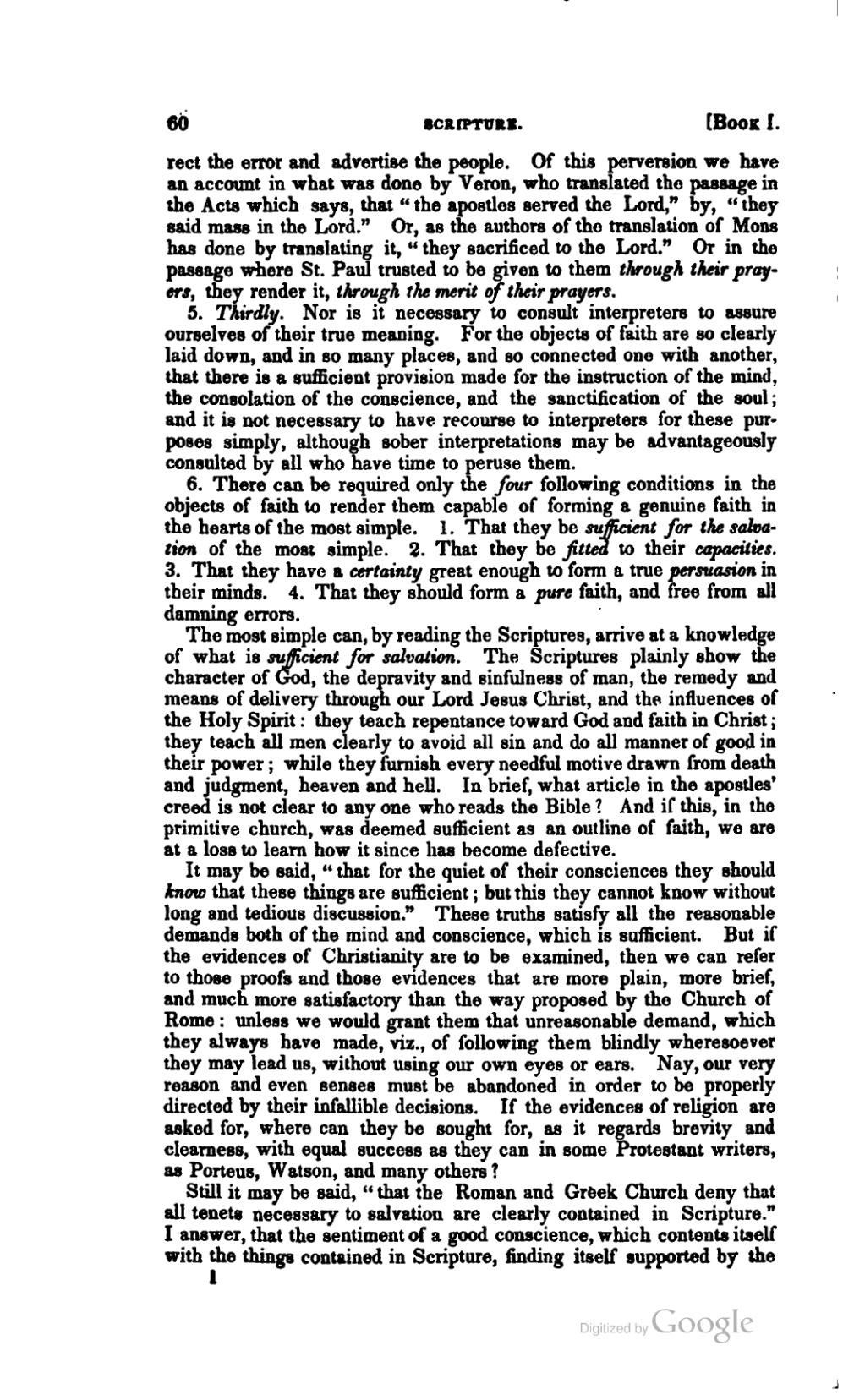rect the error and advertise the people. Of' this perversion we have all accotrot in what was done by �eron, who translated tho passage the Acts which says, that "the apesdos served the Lord," by, "they said mass in the Lord." Or, as the authors of' tho translation of Mons has done by translating it, "they sacrificed to the Lord." Or in the passage where St. Paul trusted to be given to them tArougA tAe/r pray* �r#, they render it, tArougA the rne,'/t of 5. TAdrally. Nor is it necessary to consult interpreters to assure ourselves of their true meaning. For the objects of faith are so clearly laid down, and in so many places, and so connected one with another, that there i8 a sufficient provision made for the instruction of the mind, the consolation of the conscience, and the sanctification of the soul; and it is not necessary to have recourse to interpreters for these pur* poses simply, although sober interpretations may be advantageously consulted by all who have time to peruse them. 6. There can be required only the fo?r following conditions in the objects of faith to render them capable of forming a genuine faith in the hearts of the most simple. 1. That they be ?.?,deAt for tAe tio? of the most simple. 2. That they be j/t? to their 3. That they have a cert?i, tt.? great enough to form a true ]0?'eas/o,t in their m/nds. 4. That they should form a pt?'e faith, and free from all damning errors. The most simple can, by reading the Scriptures, arrive at a knowledge of what is ?.?c/e, zt for ?dv?/o?. The Scriptures plainly show the character of Cod, the depravity and sinfulness of man, the remedy and means of delivery through our Lord Jesus (Jhrist, and the influences the Holy Spirit: they teach repentance toward Cod and faith in Christ; they teach all men clearly to avoid all 8in and do all manner of good in the/r power; while they furnish every needful motive (h-awn from death and judgment, heaven and hell. In brief, what article in the apesdes' creed is not clear to any one who reads the Bible ?. And if tiffs, in the primitive church, was deemed sufficient as an outline of faith, we are at a los8 to learn how it since has become defective. It may be said, "that for the quiet of their consciences they should A-note that these things are 8ufllcient; but this they cannot know without long and tedious discussion." These truths satisfy all the reasonable demands both of the mind and conscience, which is sufficient. But if the evidences of (Jhr/stianity are to be examined, then we can refer to those proofs and those ev/dences that are more plain, more brief, and much more satisfactory than the way proposed by the Church of Home: unless we would grant them that unreasonable demand, which they always have made, viz., of following them blindly wheresoever they may !end us, without using our own eyes or ears. Nay, our very reason and even sense8 must be abandoned in order to be properly directed by the/r infallible decisions. If the evidences of tel/g/on are asked for, where can they be sought for, as it regards brevity. and clearness, with equal success as they can in some Protestant writers, as Porteus, Watson, and many others ? Still it may be said, "that the Roman and Grt?ek Church deny that all tenets necessary to salvation are clearly contained in Scripture." I answer, that the sentiment of a good conscience, which contents itself with the things contained in Scripture, finding itself supported by the 1
�
